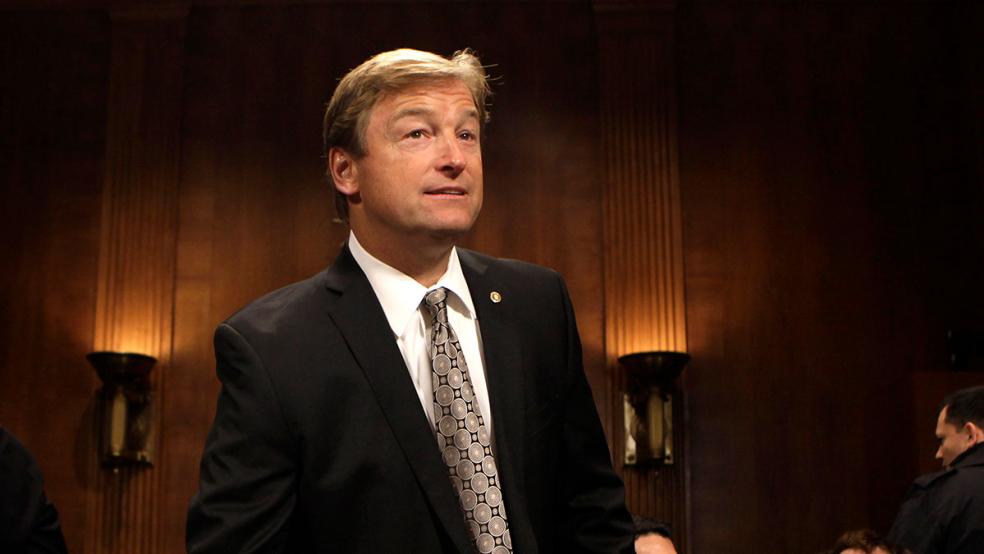If Senate Majority Leader Mitch McConnell had any big weekend plans, the announcement by Nevada Republican Sen. Dean Heller on Friday afternoon that he is not on board with Senate leadership’s health care bill probably spoiled them.
Heller’s announcement was fairly predictable, because he is one of the most vulnerable GOP senators in the 2018 elections and his support of a bill that appears to be about as popular with the American people as athlete’s foot wouldn’t exactly give his campaign a boost.
Related: The Missing Detail That Could Kill the Senate Republican Health Care Plan
However, it’s important to note the language Heller used in his statement about the bill, which he delivered standing by the side of his state’s popular governor, Brian Sandoval. The first-term senator seemed to leave the door open to compromise, saying, “In this form, I will simply not support it,” but he went on to mount an extensive critique of the bill that made the possibility of successful compromise seem remote at best.
The claim that the bill would lower consumers’ insurance premiums was “a lie,” he said. “There isn't anything in this bill that would lower premiums.”
It would, he said, cost millions of people their insurance. “I cannot support a piece of legislation that takes away insurance from tens of millions of Americans and hundreds of thousands of Nevadans.”
Sandoval’s presence at Heller’s side was significant, because the highly popular governor is one of the Republicans who led their states to accept Medicaid expansion through the Affordable Care Act. The Senate bill, like the legislation the House passed last month, would roll back that expansion, leaving millions in danger of losing their health insurance.
Heller’s announcement means that Majority Leader Mitch McConnell and his closest allies in the Senate have their work cut out for them this weekend. McConnell has said multiple times that he will press for a vote before the Senate leaves town for the Fourth of July recess, and it looks as though he has a lot of bargaining to do in the meantime.
Related: 7 Huge Tax Breaks in the Senate GOP Health Care Plan
The Senate bill couldn’t pass under an ordinary floor vote, but the GOP has opted to use a maneuver known as reconciliation that allows a bill to pass with the bare minimum of 51 votes, so long as it adheres to a complex set of rules.
With a 52-48 majority, the Republicans can only afford to lose two members, and even that would require enlisting Vice President Mike Pence to cast a tie-breaker. The apparent loss of Heller means that leadership is now within two votes of the bill failing. And there are at least four GOP senators other than Heller, all strong conservatives, who are on the record saying they don’t support the draft released Thursday.
In a joint statement, Kentucky’s Rand Paul, Texas’ Ted Cruz, Utah’s Mike Lee and Wisconsin’s Ron Johnson all said that they are unsatisfied with the proposal.
“There are provisions in this draft that represent an improvement to our current health care system, but it does not appear this draft as written will accomplish the most important promise that we made to Americans: to repeal Obamacare and lower their health care costs,” the statement said.
Few saw the announcement as a statement of complete resistance to the bill. It was widely expected that they were positioning themselves to wring some concessions out of Senate leadership.
Related: Why Some GOP Senators Are Balking at Their New Health Care Plan
However, the hard break that Heller made with the Senate bill on means any negotiations McConnell and his allies are likely to have with the conservative wing of the party will be fraught at best.
That’s because the kind of changes that Paul’s group are likely to seek -- more regulations eliminated, more taxes cut, more flexibility for state administrators -- are also likely to drive away more senators who, like Heller, are concerned about the impact the bill would have on their constituents.
The list of senators who could find themselves aligned with Heller if the bill goes much further in Paul’s direction is just as long as the list of conservatives the Kentucky senator is leading. It contains, at minimum, Susan Collins of Maine, Shelley Moore Capito of West Virginia, Rob POrtman of Ohio, and Lisa Murkowski of Alaska.
The bottom line is that this is likely to be a very long weekend for McConnell, and one that poses a very real chance of ending with the GOP’s best shot at replacing the Affordable Care Act in danger of failure.





